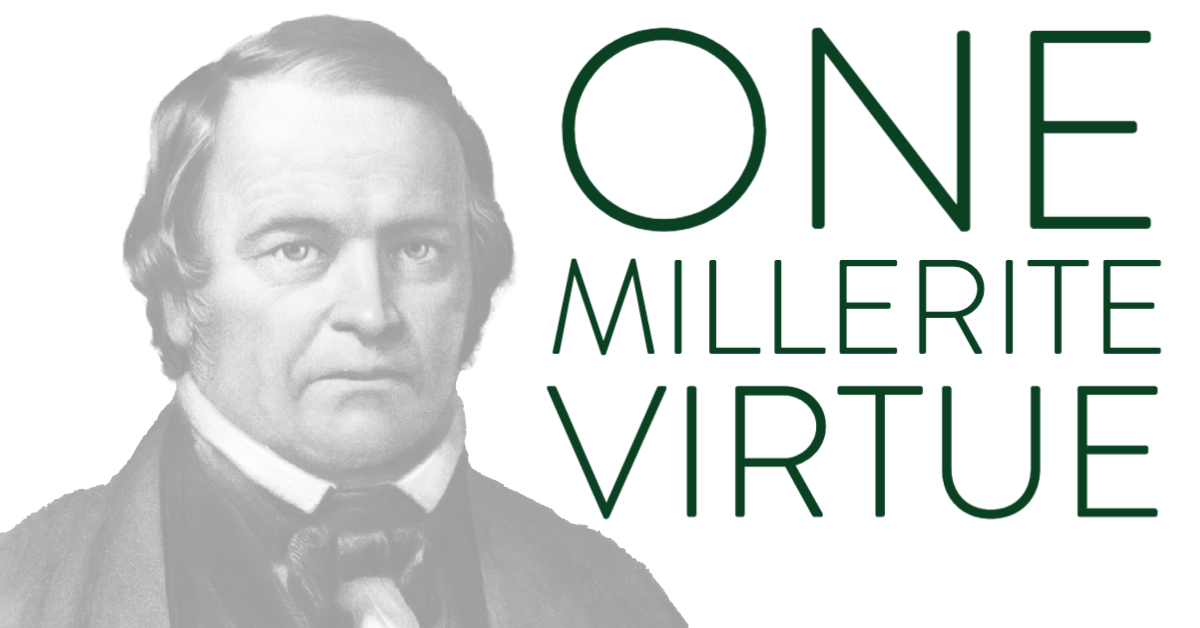One Millerite Virtue
Today (10/22) is the 177th anniversary of the Great Disappointment. If you’re a novice to the Second Advent movement here’s a way too quick run-down:
William Miller was the head of a movement that anticipated the imminent return of Christ based on historical events believed to correspond with calculations derived from the 70 weeks mentioned in Daniel 9 . With a few twists and turns, Miller ultimately settled on October 22, 1844 as his final date for Christ’s return. That return failed to materialize and thus for him and his followers (the Millerites) the day was dubbed, “The Great Disappointment.”
We can now all see that it was a foolhardy venture, that it shouldn’t have been taken up at all; Miller eventually admitted this himself. William Miller and his followers look like a pack of fools - an example of what not to do.
However, I would contend that assessing the merits of the movement is a bit more complex. To be clear, date-setting is absolutely not commendable. No, what I have in mind far more basic and entirely orthodox. The virtue I have observed is this: their faith in Christ’s return.
Even as I pay a compliment, I will quickly qualify it by saying that the Millerites and those of them who became Advent Christians did not always manifest this faith correctly. Abandoning your farms, not planning anything beyond 6 months, and shrugging off the development of schools for pastoral training, are not commendable practices of faithfully anticipating Christ’s return.
Even so, the radical practices of the Millerites and early Advent Christians left no doubt that they truly believed in the literal return of Christ. Advent Christian pacifism during the American Civil War, led by I.C. Wellcome, is to my mind the most meaningful manifestation of this conviction. These Advent Christians refused to take up arms or vote in elections, principally because they believed Christ would be returning soon. This caused them to reassess the priority of their allegiances - they concluded the coming Kingdom outweighed the political future of the United States. And this was not without cost, as they were prepared to bear all penalties for their civil disobedience.
Yes, you can disagree with their pacifist conclusions, but can you not admire their inspiration? The sincerity and depth of their faith is palpable. Such a realist perception of Christ’s return is truly virtuous.
Throw all your stones, but then consider this: how does the anticipation of Christ’s return shape your life? How does it shape your church? How does it shape our denomination?
Frankly, I think we lack the depth of faith they possessed. We live for bucket lists, not the coming King. We abandon the evangelistic task for political battles. We arrange the deck chairs of our ecclesial institutions, as billions founder in sin, and tremble at the thought of risking anything for the Gospel. Their actions speak faith, ours speak faithlessness (in more ways than one).
To be clear, my aspiration is not to live up to the faith of the Millerites - it is to surpass them. My desire is that the reality of Christ’s return would press upon me more greatly than the next American presidential election. How might I then live? How might you then live?
If felt with all its force, we would get to work. This is the meaning of the parable of the stewards for us. Will we be found faithfully working, hastening his return, when Christ comes again? Will our work testify that we are waiting for him? Or, will he be disappointed in us when he returns?
Faith in Christ’s return - this is the most precious baby in the bathwater of the Second Advent movement. Let us deliver it today.

